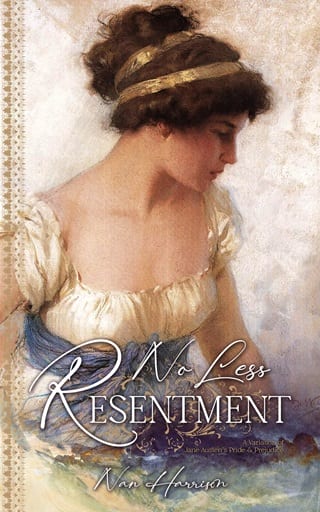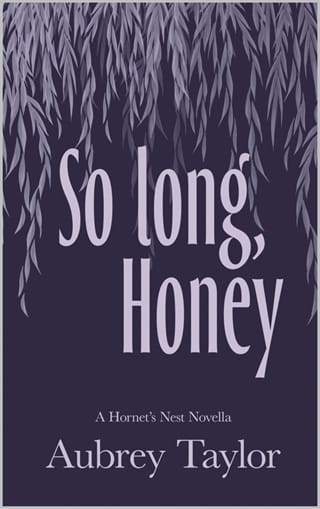Chapter 1
CHAPTER ONE
Late January 1812, Hertfordshire
A s freezing rain was wind-driven inside the cart, and the wheels bumped and slid across icy ruts, George Wickham's thoughts were swirling in his head . Lord, I am glad no one can see me! Driving a ramshackle old dogcart! At least it has a roof. Once I get to London, I'll sell it. The livery fool will never see it again. Glad I kept those letters—they fetched a goodly sum. Not the ten thousand pounds I wanted, nor the thirty thousand I should have had, but enough to set me up for a time. What to do with this stupid chit now? Will she ever stop wrenching my arm and babbling about wedding clothes? I can barely hang on to the ribbons! How did she know that I was leaving? Lord, will she not leave me alone! She has a fulsome body that should fetch a fine price in Covent Garden, I shall grant her that. After I use her for my own pleasure, that is. Good god! What is that noise? What is happening?
Later, when Elizabeth remembered that night, the worst night of her life, it was with the sense of events wheeling and spiralling out of control, their lives crashing and splintering, throwing their entire family into an unknown void. The sleet and freezing rain drumming noisily on Longbourn's slate roof. The shouting and pounding on their front door in the dark. Sir William's deeply lined face starkly shadowed by lantern light. Colonel Forster's wild eyes. Mr Jones's profound gravity. The men's brief conference in low tones; the colour draining from her father's face, ageing him decades within seconds. The shock and confusion; the noise abruptly turned to silence.
Mr Bennet had hurriedly dressed and left with the men, and, one by one, the family and servants returned to their beds. Elizabeth turned to go back up the stairs when a cold foreboding stopped her so quickly that Mary bumped into her. She moved her eyes about the room, above her on the stairs and below her in the hall. Jane was in London, but another person was unaccounted for.
A sickening thought chilled her to the bone. She opened her mouth to speak but bit her tongue. There was no use upsetting Mama before they knew what was going on. She quickly slipped to Lydia's room and opened the door, hoping against hope; but the bed was empty, still made up from the day before.
Reeling, she sank to her knees, feeling like a heavy weight pressed against her chest, forcing the breath from her body. Images flashed through her mind in rapid succession. Lydia at an assembly, tipsy with punch, flirting with the officers. Lydia unabashedly running towards the men in the middle of the high street, her bosom thrust forwards, skirts held above her ankles. Lydia at the ball, shrieking and falling all over herself. Mr Darcy, glowering not at Lydia but at her, which made no sense at all.
Elizabeth knew then that they were lost. All, all was lost.
The next morning, Longbourn House was silent; the kind of silence that comes after a thunderbolt—the silence of shock and stupefaction. An express had been sent to town during the night.
The heavy clouds had parted, and the morning sun was bright as Mrs Hill opened the wide wooden door to the laundry room at the rear of the house, where a makeshift table had been constructed of planks and sawhorses. Some of the ladies' gowns, already dyed black, were hanging to dry before the wide old hearth.
Her mistress had insisted on seeing the body over the master's violent objections but had then dropped to the floor, insensible, when she caught sight of her damaged child. She had been given laudanum not to quiet her but to help her sleep, for Mrs Bennet had been quite unable to speak.
Mrs Hill would prepare the body for burial, with Ruthie, the kitchen maid, and Martha, the maid who attended all the Miss Bennets. Mrs Jenks, the cook, stood ready as well. Mr Osbeck, the butler, personally hung the hatchment and black bunting over the front entrance with the help of Davy, the young footman. The senior servants of Longbourn had been with the Bennet family many years, Osbeck preceding even Mrs Bennet. They were all deeply attached to the family. Hill, in particular, loved the girls as if they were her own. Indeed, she loved all the family with a clear-eyed acceptance of their foibles and limitations. She had learnt very early in her childhood that one could love others in spite of their faults.
Even if Miss Lydia had disgraced them all, Hill, Ruthie, and Martha, along with Mrs Jenks, would send her to rest in love and peace. They worked in silence except for the occasional whispered remembrance: ‘let us use the lilac soap. That was her favourite' or ‘such pretty hands she had'. Hill was preparing a grey woollen shroud, and Martha was arranging Lydia's golden curls over the mortal wounds on her head when there was a knock on the door. The servants exchanged startled glances, and Jenks went to answer, barely cracking open the door.
It was Elizabeth, forlornly standing with a length of rose silk draped over her arm. "You must not look, Miss Lizzy," Jenks said gently, positioning her stout form so that Elizabeth could not see into the room.
"I know," the girl said quietly. "I wondered whether Lydia might wear her best gown instead of a shroud. She was so very proud of how she looked in it."
Jenks reached out and stroked the fabric tentatively with one finger. Behind her, Martha laughed sadly. "She would have hated the shroud."
Mrs Hill sighed deeply and looked down at the form lying on the table. Taking Lydia's hand in hers, she stroked her hair with the other while she considered. At last, she spoke. "By law, we must use a woollen shroud and nothing else, though I have heard it is often flouted." She moved to the door to stand by Jenks and looked at the gown. "She wore that to Mr Bingley's ball."
Hill regarded Elizabeth. The girl seemed so dazed, so detached, so unlike herself. Her large eyes were full of turmoil and despondency.
"Why do you wish to do this, Miss Lizzy?"
Elizabeth met her eye. "I…I do not truly understand it myself. I cannot think. My mind is numb and sluggish. My heart feels like a stone. But I know that once the shock has passed, I shall be furious with her for her foolish actions that have ruined us all. I also love her and shall miss her. Lydia will be buried soon, so there is no time for me to sort out my feelings. I think I shall regret it if I do not do something loving for her while I have the chance. I wish to say goodbye and tell her that I shall forgive her when I can."
"You do not wish to save the fabric and make it over?"
A voice came from behind Elizabeth. "Mrs Hill, I do not think any of us would wish to use it, even Mama. It will remind us too much of Lydia."
Elizabeth turned with a gasp. "Jane! Oh, Jane! You are here, you are here!" The sisters fell into each other's arms.
"Aunt and Uncle and I just arrived. We left London before dawn." Jane turned to the housekeeper. "We cannot see Lydia?"
"It would make a very bad memory for you, Miss Bennet. She was injured most grievously. Your mother insisted on seeing your sister's body, and it has made her sorrow that much worse."
Jane's chin quivered slightly, but she nodded. "Then I shall go to Lydia's room and find another pretty thing for her."
Within minutes, Jane was back, followed by Mary and Kitty. Jane held a silk flowered hairpiece, and Mary offered a pair of beaded dancing slippers. Kitty held a pair of embroidered evening gloves.
"They are mine, but I found them in her room," she said in a trembling voice. "Lydia always took my things without asking, but I think she should have them now." Her half-hearted laugh turned into a sob.
No one spoke the words; they all knew. It was unlikely that any of the Bennets would ever attend a ball again.
Hill stepped out of the laundry room and spread her arms wide, enveloping the sisters in a loose embrace. "Let us then show Miss Lydia how much we love her and send her along in style. We shall cover her finery with the shroud, but for heaven's sake, keep this to yourselves!"
 Fullepub
Fullepub 



